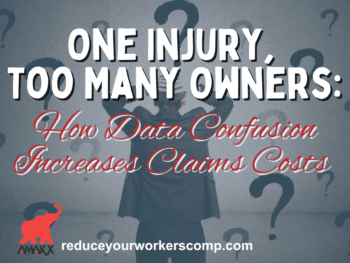As with other outlays, employers can trim workers compensation costs with thought and effort.
Costs need not be so high. Insurers, unions, workers, lawyers and doctors are all contributing to the current waste and the employers who finance workers compensation must bear much of the fault, too.(WCxKit)
Why is this?
Employers are unwittingly encouraging employees to remain on workers compensation much longer than necessary.
Lucrative Lawsuits
While workers compensation statutes prevent workers injured on the job from suing their employers, they can still sue others. Someone hurt while using a lathe, for example, can sue the lathe maker.
Better that the employer files a subrogation action against the equipment manufacturer to offset their payment of workers compensation benefits.
If such a worker receives a court award or settlement, he gets paid twice for the same injury.
In such cases, most states allow employers to seek reimbursement for sums already spent on workers compensation.
But, companies must pursue this payment during the court case; afterward is usually too late.
Pension Pay
Older workers who receive workers compensation benefits may retire during their convalescence.
The crafty among them will collect their pensions and continue to receive workers compensation
A Sweetened Pot
Some employers offer “occupational injury supplements,” which can raise workers compensation benefits from two-thirds to full salary.
Given that workers compensation is tax fee and employees at home save on commuting and other work-related costs, a full salary is more lucrative for workers on leave than for workers at work.
Thus, companies must carefully design any programs for supplemental pay to avoid any disincentives to working.
Accidental Profits
In New York, Hawaii and other states, employees who are injured when driving a car on company business may receive both workers compensation and medical benefits from their no-fault auto insurance policies.
To prevent this redundancy, no-fault benefits should be deducted from workers compensation benefits, if permitted by state law.
Employers follow many other policies that dampen the enthusiasm of those on workers compensation to return to work. Many companies keep jobs open indefinitely, for example. And others allow employees on workers compensation to accrue sick time. How can workers who are sick accumulate sick days?
Keep these benefits in mind when reducing your WC costs – when they overlap, they encourage our of work employees (OOW) employees not to come back.(WCxKit)
And coming back to work is good for the company and the employee.
Check where your pension, lawsuit and injury benefits overlap – you could be bleeding money. Find out more #WorkersComp.
Author Rebecca Shafer, JD, President of Amaxx Risks Solutions, Inc. is a national expert in the field of workers compensation. She is a writer, speaker and website publisher. Her expertise is working with employers to reduce workers compensation costs, and her clients include airlines, healthcare, printing/publishing, pharmaceuticals, retail, hospitality and manufacturing. See www.LowerWC.com for more information. Contact: RShafer@ReduceYourWorkersComp.com or 860-553-6604.
WC IQ TEST: http://www.workerscompkit.com/intro/
WORK COMP CALCULATOR: http://www.LowerWC.com/calculator.php
MODIFIED DUTY CALCULATOR: http://www.LowerWC.com/transitional-duty-cost-calculator.php
WC GROUP: http://www.linkedin.com/groups?homeNewMember=&gid=1922050/
SUBSCRIBE: Workers Comp Resource Center Newsletter
Do not use this information without independent verification. All state laws vary. You should consult with your insurance broker or agent about workers comp issues.
©2010 Amaxx Risk Solutions, Inc. All rights reserved under International Copyright Law. If you would like permission to reprint this material, contact Info@ReduceYourWorkersComp.com.



























